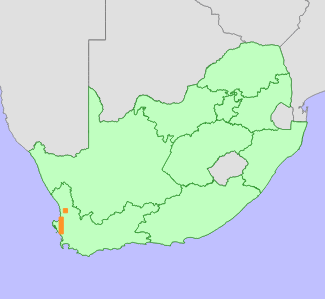|
Scientific Name | Lampranthus coccineus (Haw.) N.E.Br. |
Higher Classification | Dicotyledons |
Family | AIZOACEAE |
Synonyms | Mesembryanthemum coccineum Haw. |
National Status |
Status and Criteria | Critically Endangered C2a(i) |
Assessment Date | 2016/01/05 |
Assessor(s) | C. Klak, N.A. Helme & L. von Staden |
Justification | A range-restricted species (EOO 1063 km²), known from only five small, isolated remaining subpopulations. These subpopulations are all small, consisting of fewer than 50 mature individuals, and the population is estimated to number fewer than 250 mature individuals. This species continues to decline due to ongoing habitat loss and degradation. |
Distribution |
Endemism | South African endemic |
Provincial distribution | Western Cape |
Range | Graafwater to Saldanha and Darling. |
Habitat and Ecology |
Major system | Terrestrial |
Major habitats | Saldanha Flats Strandveld, Swartland Granite Renosterveld, Swartland Alluvium Renosterveld, Hopefield Sand Fynbos, Leipoldtville Sand Fynbos |
Description | Seasonally moist sandy flats and lowland shale. |
Threats |
| This species has already lost around 80% of its habitat to crop cultivation. All known subpopulations occur on small remnants, where loss and degradation of its habitat continues due to overgrazing, spreading alien invasive plants, and inappropriate fire management. Between Graafwater and Hopefield, habitat loss to agricultural expansion continues, with high rates of loss of Sand Fynbos to rooibos tea and potato cultivation. |
Population |
Five small, isolated subpopulations are known to remain, and continue to decline due to ongoing habitat loss and degradation. Population counts at three of these indicate that subpopulations are small, generally consisting of fewer than 50 mature individuals. As all subpopulations occur in small remnants, it is unlikely that any large subpopulations remain. The population is therefore estimated to number fewer than 250 mature individuals.
|
Population trend | Decreasing |
Notes |
| This assessment includes Lampranthus sauerae, which is suggested to not be sufficiently distinct from this taxon by Klak in Manning and Goldblatt (2012). |
Assessment History |
Taxon assessed |
Status and Criteria |
Citation/Red List version | | Lampranthus coccineus (Haw.) N.E.Br. | CR D | Raimondo et al. (2009) | |
Bibliography |
Goldblatt, P. and Manning, J.C. 2000. Cape Plants: A conspectus of the Cape Flora of South Africa. Strelitzia 9. National Botanical Institute, Cape Town.
Manning, J.C. and Goldblatt, P. 2012. Plants of the Greater Cape Floristic Region 1: The Core Cape Flora. Strelitzia 29. South African National Biodiversity Institute, Pretoria.
Raimondo, D., von Staden, L., Foden, W., Victor, J.E., Helme, N.A., Turner, R.C., Kamundi, D.A. and Manyama, P.A. 2009. Red List of South African Plants. Strelitzia 25. South African National Biodiversity Institute, Pretoria.
|
Citation |
| Klak, C., Helme, N.A. & von Staden, L. 2016. Lampranthus coccineus (Haw.) N.E.Br. National Assessment: Red List of South African Plants version 2024.1. Accessed on 2026/01/26 |
 Comment on this assessment
Comment on this assessment


